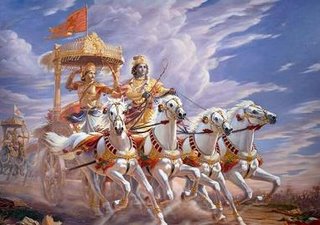
Several thousand years ago in north-central India, two people sat in a chariot in the midpoint of a great battlefield. One of them, the yogi Arjuna, knew that it would be not be long before the conflict would begin. So he asked Krishna, the Master of Yoga, what should be his attitude and perspective in this moment. And above all: What should he do?
There was no time to spare in empty words. In a brief discourse, later turned into seven hundred Sanskrit verses by the sage Vyasa, Krishna outlined to Arjuna the way to live an entire life so as to gain perfect self-knowledge and self-mastery.
The battle was ferocious and–as always with war–everyone lost. But when Vyasa wrote his epic poem, the Mahabharata, he put Krishna’s inspired words into it as a precious jewel. Instantly they were extracted, named The Song of God (Bhagavad Gita), and circulated throughout the subcontinent.
That was several thousand years ago, and today the Gita is found in every household in India and has been translated into every major language of the world. Literally billions of copies have been handwritten and printed. (A few years ago a spiritual organization in South Africa printed one million copies for free distribution!)
What is the appeal of the Gita? First of all, it is totally practical, free of any vague or abstract philosophy. During my first trip to India over forty years ago, I heard about a yogi who lived in a small houseboat on the Ganges river in the holy city of Benares (Varanasi). He never spoke or wrote; yet every day for many years people came to him for advice. How did he manage? He had a copy of the Bhagavad Gita, and after he was told the problem or question he would open the book and point to a portion. And the inquirer would have a perfect and complete solution to the trouble.
My own spiritual awakening began by kicking me out of the nest of comfortable religion into a vast world of realities I had no idea how to cope with. I floundered around in the sea of my new horizons until one day I bought a paperback edition of the Bhagavad Gita. I did not read it, I inhaled it. I was not reading the words of a long-dead teacher: my own Self was talking to me in the pages of that little book. Nor did I learn anything from the Gita–I remembered that which I had always known. Eternal Self spoke Eternal Truth. The Bhagavad Gita changed my life by giving me Life. Life that has never ended.
Nothing has ever arisen in my life, internal or external, that the Gita has not made clear and enabled me to deal with or understand. Yet is it not dogmatic. At the very end Krishna says to Arjuna: “Now I have taught you that wisdom which is the secret of secrets. Ponder it carefully. Then act as you think best.” No threats, no promises, no coercion. It is all in the reader’s hands. Even better: the Bhagavad Gita tells us that we can attain a Knowing beyond even what it tells us. And it shows us the way.
1 comment:
This blog is a gud one...bt if u can add some main principles of gita thn others can also know the importance of "BHAGWAD GITA".
Post a Comment